How to Respond to a Homesick Letter from Your Camper
The Sad Letter
You’re anticipating with much excitement your camper’s first letter from camp. It finally arrives, and this is what it says…
“I want to come home!”
“It’s awful here.”
“I hate everything.”
“This is worse than prison.”
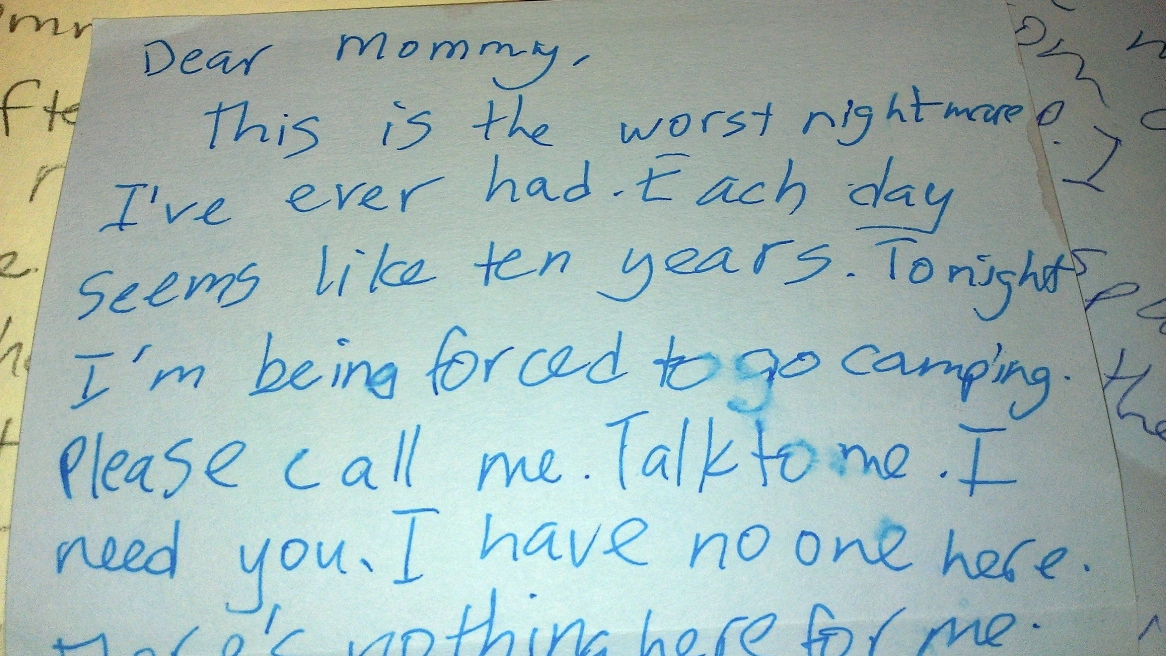
Your Options
Option #1: Hop in your car and drive to rescue your child immediately.
Option #2: Take a deep breath and think about possible next steps.
As a veteran camp director with a lot of experience helping campers (and parents) work through the difficult transition that often accompanies being away from home, especially the first time, I would highly recommend you choose option 2. It will be better for both you and your child.
Getting a sad letter from your child is difficult, but, as experienced camp parents will tell you, you should expect to receive at least one sad letter during your camper’s time at camp. Letters are usually written during quiet times when campers are feeling more reflective. Often, even when they’ve written a super sad letter, the camper is actually adjusting well to camp and is letting you know the emotions they felt during a particularly down time (like rest hour or bedtime).
Next Steps
If you feel uneasy after hearing from your camper, here are a few steps you can take (after your deep breaths, of course):
- Remind yourself that homesickness is an emotion that most campers feel to some degree at camp and many college students experience, as well. Perhaps you can remember one of your own experiences being homesick – at camp, at college, or while studying abroad.
- Call a friend who is an experienced camp parent who has likely received one of these letters in the past.
- Know that in the vast majority of homesickness, the fun and excitement of camp eventually far outweigh any sad feelings.
- Contact the camp via phone or email and ask for an update on how your camper is doing. Let them know you got a sad letter and want to see how your child is adjusting. Remember, the letter could have been written and sent a few days ago, so the emotions expressed may not still be accurate.
- Write an encouraging letter to your camper. Acknowledge that you read their letter and tell your kid you want to be updated on everything, the sad moments but also the activities and new friends and adventures they’re having. Here are some ideas for positive, encouraging messages you can send to your camper.
Positive Messages for a Homesick Camper
Whether you’re communicating with your camper via postcards, letters, email, or phone, here are some ideas for how you can respond to their sad, homesick pleas from camp.
Validate Feelings
Your child might be genuinely feeling severe discomfort from being away from home. Acknowledge that by saying, “I know you feel miserable right now and I’m sorry this is so hard for you.” However, if they ask to be picked up early or talk to you on the phone, remind them that you’re going to stick with letter-writing only and that you’re not coming to get them early!
Provide Encouragement
Reassure them that you have confidence in their ability to face this challenge and have a great camp experience. Say, “Even though you don’t feel like you can do this, I know you can.” Let them know how proud you are of their independence and how excited you are to hear of their accomplishments when they finish camp.
Redirect
Redirect the conversation to something positive. Comment on a recent picture you saw of them online: I saw a picture of you jumping off your paddle board! It looked like so much fun! You can also help your child focus on the positive by reminding them of some of the positive things of camp that they don’t get to experience at home: “I can’t believe you get to have a campfire with marshmallows every night. Lucky duck!” Sometimes kids are concerned that they’re missing out on things happening at home or get worried about you missing them too much. Update them on some of the boring, busywork happening at home to assure them that camp is where they’re supposed to be. Asking questions about an activity they were particularly excited about or about their cabin mates and counselors can also be fun.
Remember the WHY of camp
As you deal with hearing about your child’s discomfort, it’s important to remind yourself and your camper why you chose the camp experience in the first place! Sometimes homesickness is part of the growth process, but we can instill confidence in our campers by encouraging them through uncomfortable and challenging situations rather than completely removing them from all sources of discomfort.
For many kids, camp is their first step toward independence. Leaving the familiarity of home for the first time, most kids experience some degree of discomfort or unease as they adjust to new people, activities, challenges, and experiences. These feelings of discomfort are completely normal, and it is important to discuss the normalcy of homesickness and feeling uncomfortable in new environments before your child leaves for camp.
In Homesick and Happy, Michael Thompson says that “Homesickness is not a psychiatric illness. It is not a disorder. It is the natural, inevitable consequence of leaving home. Every child is going to feel it, more or less, sooner or later. Every adult has had to face it and overcome it at some point in life … If you cannot master it, you cannot leave home.”
Real growth only comes when we’re stretched beyond our comfort zones, and that is why so many campers grow more confident during their time at camp: their comfort zone is stretched and they succeed in meeting the new challenges. Some kids end up adjusting and feeling comfortable quickly while others have a harder time adjusting. Either way, there are several ways you can both prepare and support your camper before and during their time at camp.
The biggest struggle for parents often is having to hear about the discomfort of their children as they navigate homesickness, but experienced camp leaders are well-equipped to encourage and come alongside both you and your child to make camp the most positive experience possible!
Article originally published at Sunshine Parenting.

Audrey “Sunshine” Monke, MA, has been the owner of Gold Arrow Camp since 1989 and currently serves as the Chief Visionary Officer. In addition to her vision-casting and mentoring at GAC, Sunshine is an author (Happy Campers: 9 Summer Camp Secrets for Raising Kids Who Become Thriving Adults), podcast host, speaker and coach on the topics of parenting, social skills, and happiness. Find out more at her website, Sunshine Parenting.
Visit Sunshine Parenting for more summer camp-related posts & podcast episodes.
Related Posts & Podcast Episodes
Sunshine & Michael Thompson, Ph.D. on the GAC POGcast
Homesick and Happy Book Discussion Guide
“Kidsickness: Help for First-Time Camp Parents”
Resources
10 Desperate Letters I Wrote From Sleepaway Camp
P.S. I Hate it Here (Book of letters from camp)
Homesick & Happy: How Time Away from Parents Can Help a Child Grow (book) by Michael Thompson, Ph.D.
Summer Camp Handbook (online edition), by Dr. Christopher Thurber
Messages For An Anxious Camper
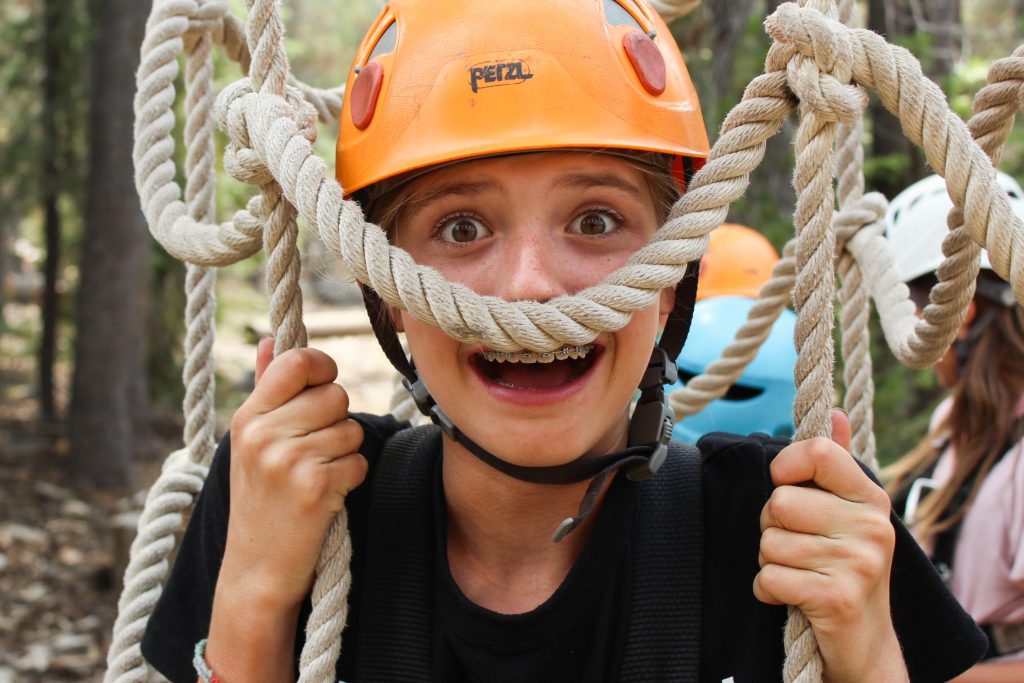
Read more of Sunshine’s camp-related posts at her website, Sunshine Parenting.
“Children want to be independent, and they realize that they cannot be truly independent until they beat homesickness, even when they have a painful case of it.”
– Michael Thompson, PhD., Homesick and Happy
Recently I spoke with a mom whose 11-year-old son is coming to camp in a few days. He’s nervous. He had a negative experience at a one-week science camp. He doesn’t think he can “make it for two weeks” and is worried he’ll be too homesick to make it at camp. I chatted with the mom and gave her some key messages to communicate to her son. She asked for them in bullet points in an email, and I thought there are probably others who might benefit from this same list, so I’m sharing this with anyone who has a child suffering from pre-camp anxiety.
Before I share my list, let me say that if you are not a camp proponent and don’t plan on sending your child to camp, you should probably not read any further. I am a huge supporter of camp and recently had a JC (Junior Counselor) tell me that “Camp made her who she is today.” So, I think that camp is a great thing for building kids’ independence and confidence. I have also seen many kids work through some pretty painful emotions at camp, so I know that camp is not easy for all kids.
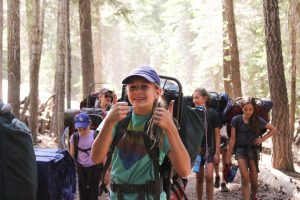 We have 7-year-olds at our camp who do great during our two-week sessions. They are the ones who’ve begged their parents to let them come to camp and generally have older siblings who’ve attended camp. I also talk to a lot of parents with older kids who “aren’t sure if they’re ready for camp.” One thing I’ve learned after close to three decades at camp is that the same kids who are anxious and hesitant about going to camp when they’re nine or ten will still be anxious when they’re 13. And they may not be interested in going away to college when they’re 18, either.
We have 7-year-olds at our camp who do great during our two-week sessions. They are the ones who’ve begged their parents to let them come to camp and generally have older siblings who’ve attended camp. I also talk to a lot of parents with older kids who “aren’t sure if they’re ready for camp.” One thing I’ve learned after close to three decades at camp is that the same kids who are anxious and hesitant about going to camp when they’re nine or ten will still be anxious when they’re 13. And they may not be interested in going away to college when they’re 18, either.
So, as a parent, you need to decide how to approach your child’s separation anxiety, as well as your own. You can avoid it and not send them to camp and hope that they develop independence in other ways, which is definitely possible. Or, you can bite the bullet, give them these positive messages, and send them off to camp with a smile, knowing that it may be hard for them, but they will grow from the experience.
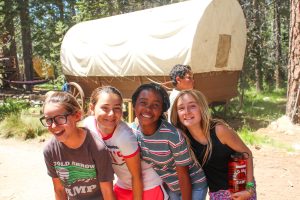
In Michael Thompson, PhD.’s book Homesick and Happy, he says “It is the very challenge of camp that makes it such a life-changing experience for so many children.” I know there are many parents and children who just can’t stomach the idea of going through some painful time apart. Again, you need not read further if you are not sending your reluctant child to camp.
This post is for those of you who have decided that your child is going to camp, and especially for those of you who had a previously excited camper who is now having last-minute camp anxiety. Here are some messages you can give prior to dropping your camper at the bus or at camp. Pick and choose, and of course, use your own words, but acknowledge your child’s feelings and empathize with them while holding firm in your confidence in their ability to succeed and your belief that camp will be good for them.
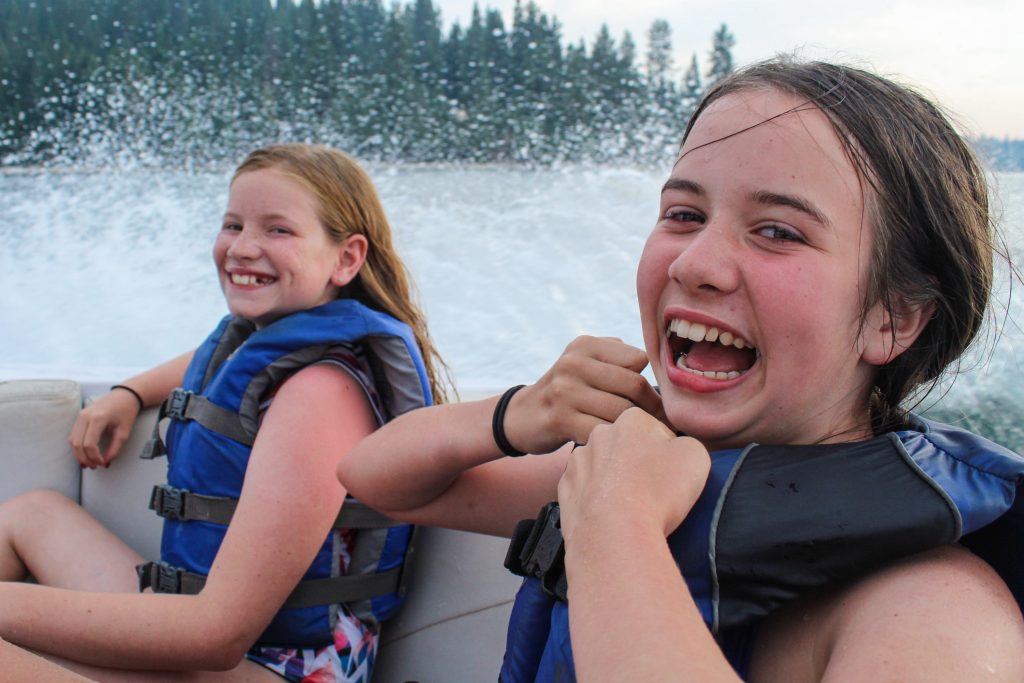
Without further ado, here are some messages to give to your anxious camper:
-
Let them know that missing home is okay.
“You may feel homesick, and that’s okay. A lot of kids feel that way. That just means that you love us and you love home. I feel homesick when I’m on trips, too. Missing home is part of life. But I know you can still have fun at camp, even if you feel sad sometimes.”
-
Reassure them that there are people at camp who will take care of their needs.
“There are adults at camp (counselors, directors) who are there to take care of you and help you with anything you need. They can help with things you normally come to me about. Let them know if you are feeling sad, and they can help you. They have lots of experience working with kids who are away from home for the first time.”
-
Talk with your child honestly about the importance of starting to develop some independence.
Something along the lines of: “It may seem like a long way off, but in a few years, you’ll be ready for college. I want you to feel confident in your ability to live away from me so that you can choose any school you like, even if it’s far away from home. Think of camp like your practice time for when you’re older and ready to move away for school or a job. You’ll get better at being independent by starting now, when you’re young, with short spurts of time away. Some kids aren’t doing well when they start college because they don’t have any experience being away from home. I want you to feel great when you go to college because you’ll know that you’ve already been successful with short camp stays.”
-
Share the reality that many good things in life come with some pain and failure.
If you have a story from your own life of something that you had to work hard at or had to go through difficulties in order to master, this is a great time to share. Something along the lines of, “Many good things in life aren’t easy at first. Learning a new sport or trying something new is really hard. Sometimes you have to get out of your comfort zone to discover something you really love. If you never go through anything hard, you’re going to miss out on some great experiences. The first few days of camp may be hard, and that’s okay. I know you’ll work through it and figure out what makes you feel better. I have confidence in you, and I am so proud of you for going to camp and trying this new adventure!
-
Let them know that you are confident in them.
“I am so excited that you get to go to camp this year. I know it’s going to be such a great experience for you and that you are ready for this.” If you went to camp, share with your camper what you liked about it and how you grew from the experience.
-
Make sure they know you want to hear about everything.
“Every day comes with its good and bad parts. When you’re at camp, I want you to write me letters and tell me all of the stuff that you’re doing and feeling. If you feel homesick at rest time, tell me about it, and also tell me what you did to help yourself. Did you talk to your counselor? Keep yourself busy playing cards with friends? Write me a letter? I also want you to share good stuff. Did you get your favorite food for lunch? Try rock climbing? Get up on a kneeboard? I want to hear both the good and bad things about camp in your letters.”
-
If your camper asks you if you will pick him up if he’s sad, you need to let him know that you are not going to pick him up early.
“Even if you’re a little homesick for the whole time you’re at camp, you’re going to feel so much better about the experience if you stick it out and make the best of it. Most kids feel better after a few days of getting settled in and adjusted, and I know you’ll feel great once you let yourself relax and just start enjoying all the fun things at camp. I’m not going to pick you up early, no matter what, because I know you will feel really proud of yourself for making it through camp, even if you have some hard days.”
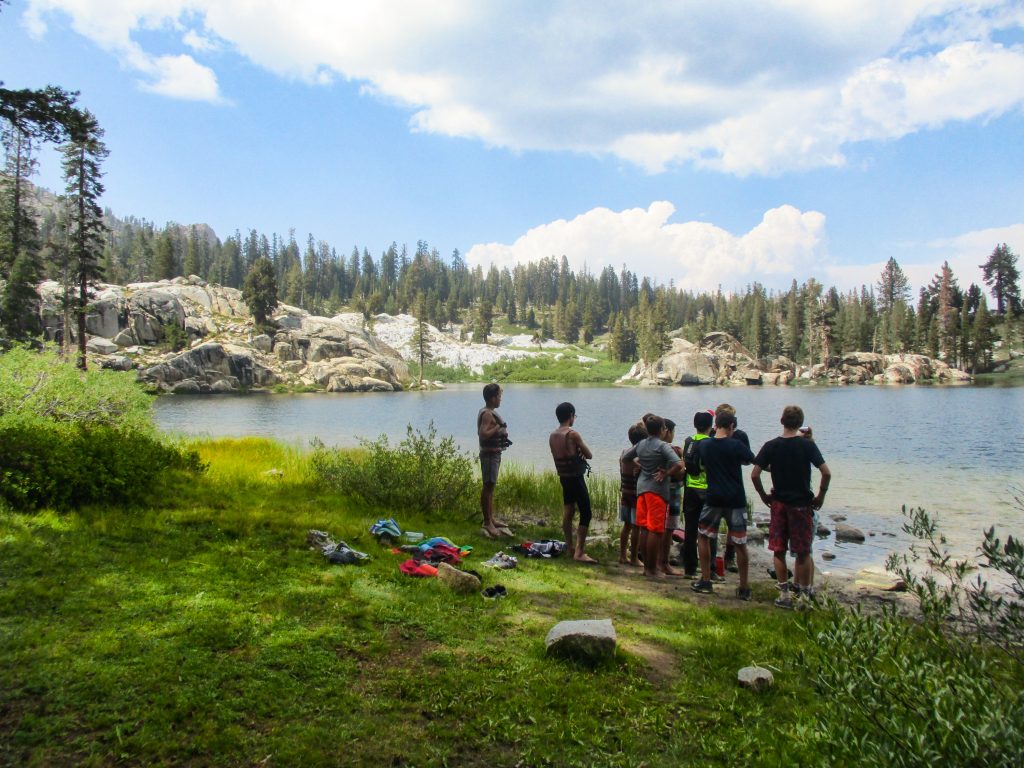
In Homesick and Happy, Thompson says, “Homesickness is not a psychiatric illness. It is not a disorder. It is the natural, inevitable consequence of leaving home. Every child is going to feel it, more or less, sooner or later. Every adult has had to face it and overcome it at some point in life … If you cannot master it, you cannot leave home.”

I would like to note that you do not need to use all of these messages but instead choose the ones you think will resonate most with your child. What’s most important is that you express confidence in your child and in the camp experience. These same messages would be great as responses to a sad letter you receive from your camper.
I always tell the kids that the fun and happy feelings at camp usually far outweigh any sad feelings. Many kids tell me they “don’t feel homesick at all,” but there are some who struggle, especially during their first summer. Those kids seem to grow the most and feel the most pride in their accomplishment of staying at camp. If you are feeling worried about how your child will do at camp, know that you are giving your child a precious gift by allowing them this special time where they get to grow their wings.
Why Camp Pick-Up Deals Don’t Work
“If you’re sad or uncomfortable, I’ll come pick you up right away.”
In camp director lingo, we call this kind of pre-camp statement a “pick up deal.” And it’s a terrible idea. In fact, it’s a terrible idea to rescue kids from most forms of discomfort – something parents seem to be more prone to do these days.
Three decades ago, when I started as a camp director, it was unheard of for a parent to pick a child up early from camp due to homesickness. Parents knew that homesickness was part of the camp experience for many kids and that it was something their child – like thousands before them – would work through.
These days, we have a handful of campers who go home early every summer. Why? Because their parents can’t handle their child’s discomfort. As soon as a parent says, “Well, I said he could try it for a few days and if he didn’t like it, I would come get him,” we know there’s nothing we can do to help this child – and parent – be successful at working through the discomfort of their first separation from one another.
In our pre-camp literature to parents, we’re clear about homesickness dos and don’ts. Included in the “dos” is a reminder to “Expect a sad letter” and realize it may have been written during a quiet time when the camper was feeling reflective. Usually, campers feel much better long before the letter reaches home.
Among the “don’ts” are warnings against telling campers you will rescue them if they miss home or are sad. Nor should parents respond to sad letters with sad letters of their own. It’s okay to write that you miss your camper, but to tell them you are miserable as well, and so is the dog, will only make your camper want to come home even more. If your child is homesick, it will be encouraging to hear that “nothing exciting is happening at home.”
It takes a brave parent to allow their young child to go away to summer camp for a week or two and trust the camp staff will care for that child’s needs. But some parents who aren’t ready to let their child go to camp send them anyway, only to set their child up for failure.
Do campers feel uncomfortable at times?
Do campers sometimes get sad and miss home?
Yes and yes. And both of these are good things for their development into a functioning, thriving, independent adult human! They will need this later, when it’s time to leave home for college. Remember this: Summer camp is one of the very few places where young kids have the opportunity to grow their independence from parents.
So what do you say to your kid who’s experiencing normal pre-camp jitters? The truth is always a great option:
“There could be some challenging moments at camp, and I’m confident that you’re ready for this experience.” Or, “Feeling sad or uncomfortable is a normal part of new experiences. The great news is that you’ll grow and be more prepared for all of your future life adventures!”
So, is your child ready for camp? The better question might be this: Are you ready to be a camp parent?
If you can’t send your child to camp with confidence in their ability to work through the inevitable discomfort, the answer may be no. But if you can convince yourself that both you and your child are ready for the camp experience, what’s stopping you? There could be no better way to help your child grow.
Originally published by LET GROW under the title,
“Setting Your Child Up to Fail at Summer Camp.

Audrey “Sunshine” Monke, MA, has been the owner of Gold Arrow Camp since 1989 and currently serves as the Chief Visionary Officer. In addition to her vision-casting and mentoring at GAC, Sunshine is an author (Happy Campers: 9 Summer Camp Secrets for Raising Kids Who Become Thriving Adults), podcast host, speaker and coach on the topics of parenting, social skills, and happiness. Find out more at her website, Sunshine Parenting.
Visit Sunshine Parenting for more summer camp-related posts & podcast episodes.
Resources/Related Posts & Podcast Episodes
Homesick and Happy Book Discussion
Why Kids Need to Get Uncomfortable
Want An Independent, Self-Confident Kid? Camp Can Help!

Homesick and Happy Book Discussion Guide
Every child has to practice being independent and every parent has to practice letting his or her child be independent.
-Michael Thompson, Ph.D., Homesick & Happy: How Time Away from Parents Can Help a Child Grow
Most kids feel some apprehension before going on their first adventure away from home without parents. Many parents are also nervous about the separation from their child, especially if your camper is expressing anxiety about going away to camp.
The biggest source of parental concern is often how your child will handle the separation from you and if they will experience negative emotions, often referred to as “homesickness,” while at camp. While most kids do not feel extreme symptoms of homesickness at camp, many experience emotional challenges during their first (and subsequent) experiences at summer camp and other away-from-parent experiences. These feelings are normal and are something that we have helped many campers work through. Campers feel a great sense of accomplishment when they successfully overcome the challenge of homesickness, and we encourage you to view this experience through the lens of the long-term positive outcomes for your child.
One of our favorite resources for first-time camp parents is Michael Thompson, Ph.D.’s book Homesick and Happy. Parents will find this book helpful not only as you prepare to send your child to GAC this summer, but also as you think about and prepare your child for other future adventures away from you (like college!).
We know many of you are busy and won’t have time to read the whole book, so here are a few ways to get a quick overview:
• Read through our summary notes (sent with the book)
• Listen to Sunshine’s 2020 interview with Dr. Thompson on the GAC POGCAST.
• Listen to Sunshine’s 2017 interview with Thompson on the Sunshine Parenting podcast.
Book Highlights
The following selected passages will help you understand and communicate with your child about why this experience – even if they feel some (or a lot of) homesickness – is important for their development and growth into a thriving adolescent and adult.
Why parents need to “step aside”: p. 8-9 starting at “I believe…”
Eight things parents can’t give children: p.11
Why kids try more things with a camp counselor than they will with you: p. 19
Why kids need to master homesickness: p. 68-70
What parents can do to prevent or lessen homesickness: p. 89-92
Ten elements of a camp experience that create emotionally powerful experiences for children: p. 202-233
“Childsick” and Happy (info for parents missing their kids at camp): p. 238-251
Quotes from Homesick & Happy
Children want to be independent, and they realize that they cannot be truly independent until they beat homesickness, even when they have a painful case of it.
At sleepaway camp, campers send an average of zero texts per day. Into the space created flows a bunch of old-fashioned human behaviors: eye-to-eye contact, physical affection, spontaneous running and jumping, or simple wandering.
